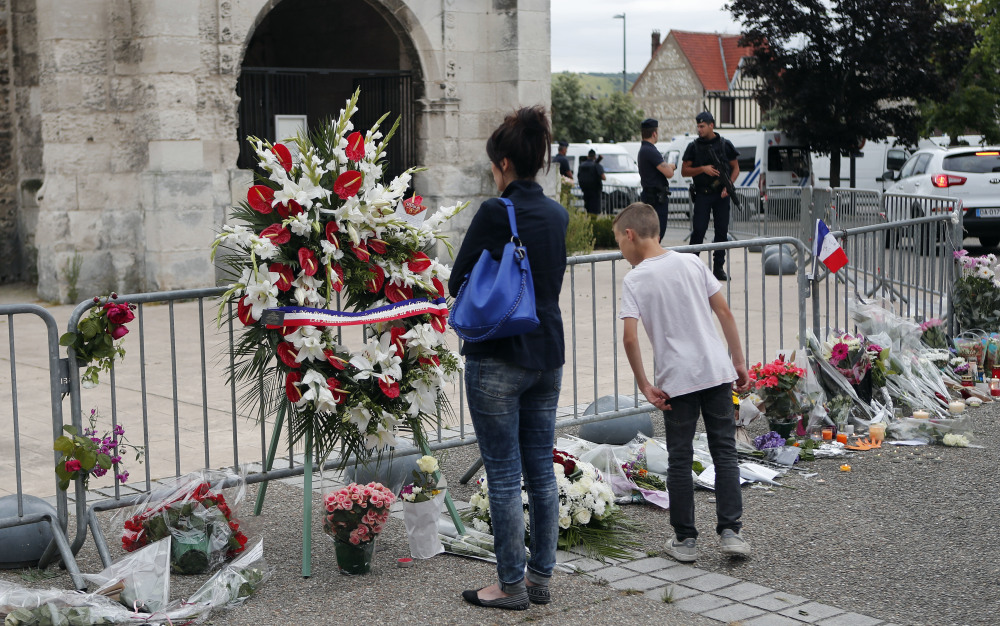PARIS — The Islamic State-inspired attack on a quiet village church in northern France on Tuesday was relatively small: one dead and just one other injured. But its significance was anything but.
In a country where the village church remains a national symbol, many here see the attack as an exacerbation of a long-brewing culture war over religion in a nominally secular but increasingly divided society.
Of the major terrorist attacks that have rocked this country over the past year and a half – Charlie Hebdo in January 2015, Paris in November 2015 and Nice earlier this month – none has been perceived so strongly as an Islamic affront to the age-old idea of a Catholic France.
For prominent conservatives here, that was the essence of the horror that transpired in the working-class town of Saint-Étienne-du-Rouvray shortly after 9:24 a.m. Tuesday.
At that moment, Adel Kermiche – a 19-year-old local man already known to anti-terrorism investigators for having tried, unsuccessfully, to enter Syria twice last year – stormed into the local parish with an unnamed accomplice and slit the throat of Jacques Hamel, a beloved 85-year-old priest who was in the middle of conducting Mass.
Kermiche had frequently posted to social media urging fellow Muslims in France to immigrate to Islamic countries or perpetrate attacks on French soil, according to an analysis by the Middle East Media Research Institute.
MORE OF A THREAT
Almost immediately after the news broke, Nicolas Sarkozy, France’s former president, on Twitter proclaimed the attack to be against the “soul of France.” Likewise, Marine Le Pen, the fiery leader of France’s far-right National Front, said in a statement that the attack threatened “the cultural identity of the nation.”
“When will the powers that be take the necessary measures and finally end the decades of laxity and blindness that have led France to where it is now?” she said.
For her and others, the church assault, however small, was more of a threat to the French nation than other recent attacks that claimed many more lives.
After the November attacks in Paris, for instance, when 130 people were slain at a concert hall and at cafes, Sarkozy merely said that “the terrorists have declared war.” For Le Pen, November showed that “the center of France was struck by an exceptional barbarity.”
But the slaying of a priest in a country church was somehow an attack on what makes France French.
Although it has been officially secular since 1905, France is still a country of some 45,000 Catholic churches, and its public holidays are virtually all Christian holidays.
It is also a country with one of the largest Muslim populations in Europe, where wearing the veil in public is strictly prohibited and where controversy broke out last month when the education minister floated the idea of teaching Arabic to elementary students in public schools.
“In France, it’s French culture that one must study first,” Bruno Le Maire, a conservative member of Parliament, told BFM TV at the time. The underlying assumption: “French” culture includes neither Arabic nor Islam.
EXPLOITING TENSION
To many French Muslims, it is this tension that Islamic State operatives have long attempted to exploit and that this most recent attack has returned to the foreground.
“A common interest in far-right groups here and Daesh there has been to create this division in French society,” Marwan Muhammad, director of the Collective Against Islamophobia in France, said in an interview, using the Arabic acronym for the Islamic State.
While some in the French Muslim community fear reprisals after the church attack, others have expressed a desire to change their community’s public image. Speaking to reporters on Wednesday, Dalil Boubakeur, the chief imam of Paris’s Grand Mosque, went so far as to advocate a rare call for a “reform” of France’s Islamic institutions, although he did not elaborate.
“I would like to express in the name of all French Muslims the profound loss and psychological upheaval they feel after the announcement of the blasphemous sacrilege contrary to all the teachings of our religion,” he said.
Boubakeur could not be reached for further comment.
Also on Wednesday, Pope Francis dismissed out of hand the idea of “religious wars” in France: “All religions want peace. Do you understand?”
But for Muhammad, the fear is that an extremist minority will worsen growing tensions between a certain faction of the French right and Islam in general.
“Their main hope is to antagonize our democracy by forcing each and every one of us to take a side,” he said of Islamic State operatives. “And that’s basically what Marine Le Pen and the others are providing for Daesh.”
Send questions/comments to the editors.



Success. Please wait for the page to reload. If the page does not reload within 5 seconds, please refresh the page.
Enter your email and password to access comments.
Hi, to comment on stories you must . This profile is in addition to your subscription and website login.
Already have a commenting profile? .
Invalid username/password.
Please check your email to confirm and complete your registration.
Only subscribers are eligible to post comments. Please subscribe or login first for digital access. Here’s why.
Use the form below to reset your password. When you've submitted your account email, we will send an email with a reset code.